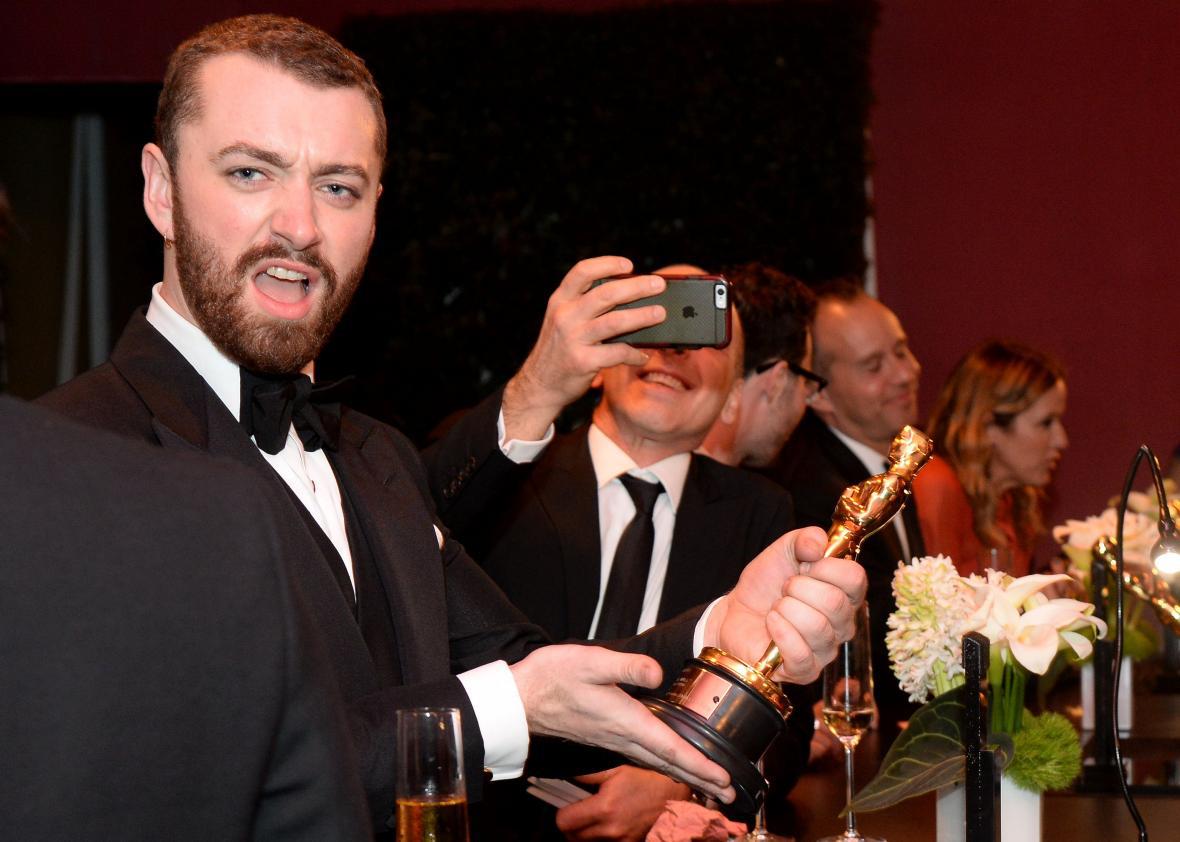The gay internet exploded on Sunday night after Sam Smith offered an Oscar acceptance speech that omitted the long history of gay Academy Award winners. After he tentatively announced that he believed “no openly gay man had ever won an Oscar,” the singer expressed his hope that “we can all stand together as equals one day.” While most viewers appreciated his support for LGBTQ visibility, they also wondered how it was possible that Smith could forget about past awards given to a range of out recipients including Dustin Lance Black, Stephen Sondheim, and Elton John. Unfortunately, this was a kind of queer amnesia that, although frustrating, is quite common.
Admittedly, it might be unfair to expect a British performer to delve deeply into the weeds of gay American entertainment history. But it also seems likely that Smith’s mistake could happen to a born-and-raised American—after all, ours is a country where the LGBTQ past continues to be erased from U.S. history books.
Though some have called for the LGBTQ community to learn about their history as a form of community engagement, it is also the responsibility of educators to teach this history. However, teaching the history of sexuality in American classrooms remains the exception rather than the rule. The AP American History curriculum, which awards college credit to high school students, barely gives LGBTQ people passing notice—and they first appear only in the late-twentieth century. How can LGBTQ people understand their history if they fail to register as historical subjects? Shouldn’t our best and brightest be equipped with knowledge about the history of sexuality if they are to truly understand the full arc of American history?
Public schools need to do a better job at teaching this history beginning in grades K-through-12. As it stands, California remains the only state in America that requires students to learn LGBTQ history in their public schools. The FAIR Education Act, passed in 2011, requires classrooms to include lesbian, gay, bisexual, and transgender history as part of the state’s inclusionary education requirement. This bill has the potential to significantly shift the conversation about teaching LGBTQ history because California comprises a huge share of the textbook market. Once textbooks satisfy the FAIR Act, they can be adopted in schools across the country.
Meeting that requirement, however, also means more professional historians are needed to do the work of writing queer history in the first place. The Committee on LGBTQ History, an organization that pushes for greater attention to the history of sexuality (and on which I am a board member) sponsored a 68-page report in 2014 that proposed revisions to California’s History-Social Science framework to comply with the FAIR Act. This report offered suggestions that could be taught from Grades 2-through-11, and the LGBTQ content was incorporated into historical units reaching back to early America. The history of sexuality and gender was understood to be interwoven throughout American history, not only when gay people became legible as a politically-organized community in the mid-20th century. To date, no professionally published textbook has fully incorporated this history.
In order for that to happen, historians will need to prioritize learning about, teaching, and publishing LGBTQ history, and universities will need to do a better job hiring historians of sexuality and gender. In his summary of a groundbreaking 2001 report on LGBTQ History careers, historian Marc Stein determined that “despite a significant increase in the number of LGBTQ history PhDs produced over the past decade, U.S. history departments have not made a commensurate increase in hiring such scholars to tenure-track position.” That remains true 15 years after that report first raised alarms: Even as LGBTQ history has become more institutionalized, those doing that work continue to face tremendous pressure on the job market that prevents many of them from securing tenure-track employment, and History departments continue to prioritize hiring in other areas before creating positions for experts in the history of sexuality. Learning about LGBTQ history requires universities to dedicate resources that will make teaching that history possible. Universities will need to offer more tenure-track lines in history of sexuality and gender, and departments will need to teach the history of sexuality and gender in all their courses.
I am fortunate to work as a professor in a department at the University of Massachusetts Boston that not only hired me to teach the history of sexuality and gender, but which also fully incorporates LGBTQ history across its curriculum. Even those students who do not opt to take a course on Sexual Identities in American Culture might enroll in our required course on American Identities, where they learn about lesbians and trans people across the twentieth century. And they can study figures like Sylvia Rivera, in courses on Latinos in the US. Sadly, that opportunity is unavailable in too many universities across the United States, even more so as austerity starves interdisciplinary departments and colleges.
If higher education were committed to foregrounding the history of sexuality and gender, fewer people (including Oscar winners) would struggle to connect their own gay history with a usable past. And that outcome is worth fighting for: After all, if we truly are to stand together, we must begin by knowing who we are and from whence we came.
